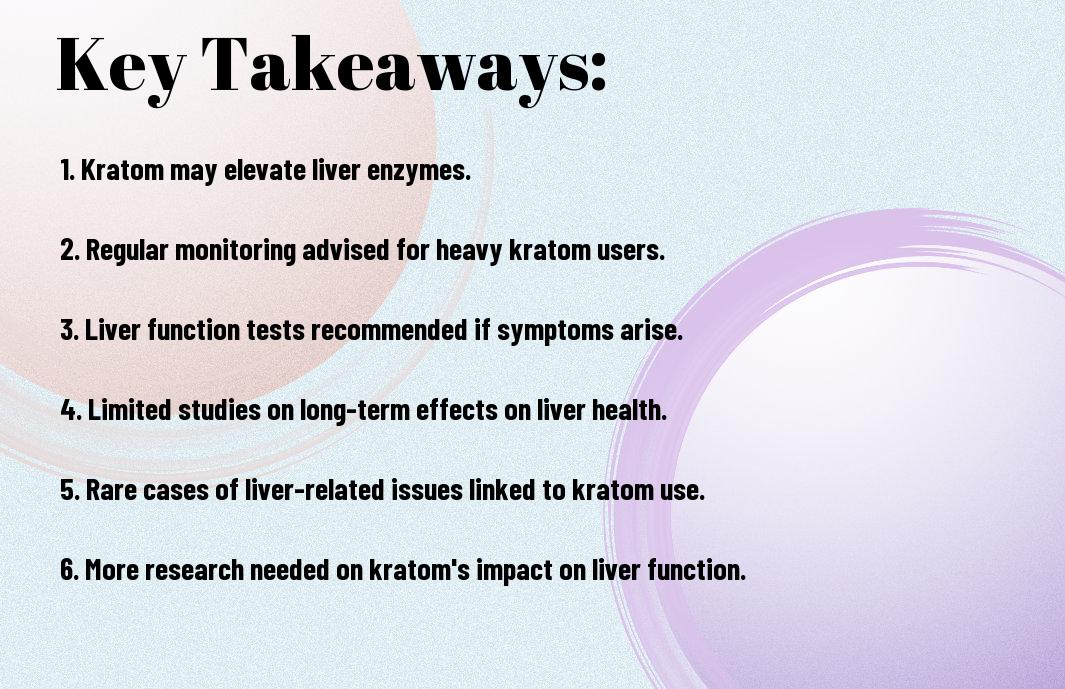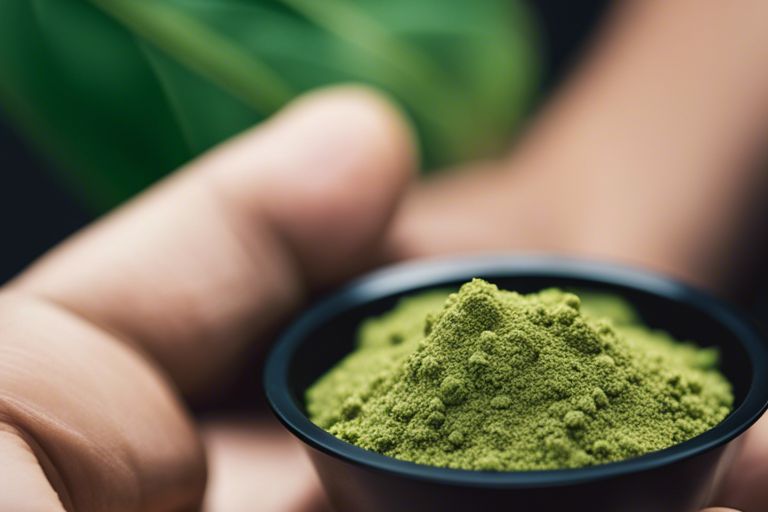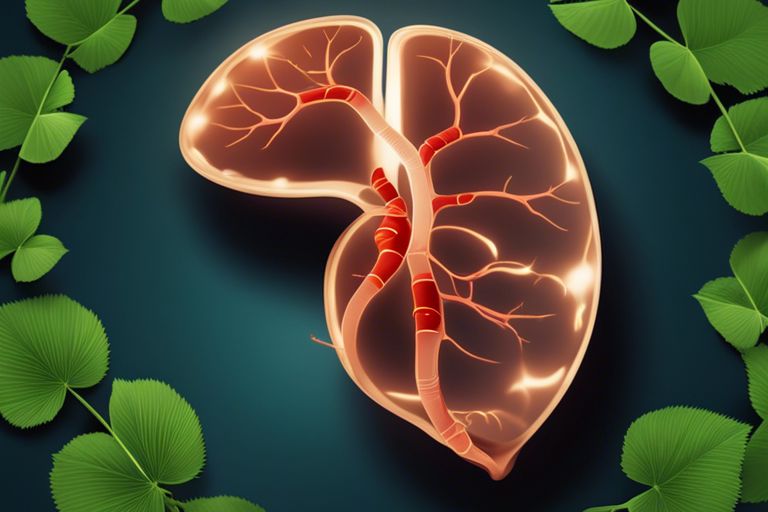You may be wondering about the effects of kratom on your liver enzymes. Understanding how kratom interacts with liver enzymes is crucial for its safe consumption. Your liver processes kratom, and certain compounds in this botanical may affect liver function. In this post, we will explore the relationship between kratom and liver enzymes, potential risks, and factors to consider for your health and well-being.

Kratom Basics
What is Kratom?
One of the first things you need to understand about kratom is that it comes from the leaves of the Mitragyna speciosa tree, which is native to Southeast Asia. The leaves are known for their unique properties, which can have stimulant or sedative effects depending on the dosage.
When you consume kratom, the active compounds in the leaves interact with opioid receptors in your brain, producing effects similar to opiates. However, kratom is not an opiate itself, but rather a plant-based substance with its own set of properties and potential benefits.
History and Traditional Use
For centuries, kratom has been used in traditional Southeast Asian medicine for its stimulant and pain-relieving properties. In countries like Thailand, Malaysia, and Indonesia, people would chew on the leaves or brew them into a tea to help increase energy levels and manage various ailments.

Liver Enzymes 101
What are Liver Enzymes?
It is important to understand what liver enzymes are and how they function in your body. Liver enzymes are proteins that help speed up chemical reactions in the liver. They play a crucial role in breaking down substances like drugs, alcohol, and nutrients. The liver produces several enzymes, including alanine transaminase (ALT), aspartate transaminase (AST), alkaline phosphatase (ALP), and gamma-glutamyl transferase (GGT).
Importance of Liver Enzymes in Metabolism
With your liver being the primary organ responsible for metabolizing substances in your body, liver enzymes play a vital role in this process. They help convert nutrients into energy, detoxify harmful substances, and regulate metabolism. An imbalance in liver enzymes can indicate liver damage or disease, making it necessary to monitor their levels through blood tests.
Liver enzymes also play a key role in breaking down medications and drugs, making them more manageable for your body to process. They can impact how efficiently your body metabolizes certain substances, affecting their efficacy and potential side effects. Keeping your liver enzymes in check is crucial for maintaining overall health and well-being.
The Interaction Between Kratom and Liver Enzymes
How Kratom Affects Liver Enzymes
To understand the interaction between kratom and liver enzymes, it’s important to know that kratom contains compounds that are metabolized by enzymes in the liver. When you consume kratom, these compounds are broken down by liver enzymes to be eliminated from your body. This process can impact the activity of various liver enzymes, including those involved in drug metabolism.
Short-Term Effects on Liver Enzyme Activity
Enzymes in your liver play a crucial role in metabolizing substances that enter your body, including kratom. Short-term use of kratom can lead to changes in liver enzyme activity as these enzymes work to process and eliminate kratom’s compounds. However, in most cases, these changes are transient and return to normal once the effects of kratom wear off.
The short-term effects on liver enzyme activity may vary from person to person based on factors like dosage, frequency of use, and individual differences in metabolism. It’s imperative to be mindful of how your body reacts to kratom and monitor any changes in liver enzyme levels if you are a regular user.
Long-Term Consequences of Kratom Use on Liver Enzymes
Interaction between kratom and liver enzymes over the long term is a topic of ongoing research. Some studies suggest that prolonged and high-dose kratom use may lead to liver damage or abnormal liver function tests. It’s crucial to be aware of the potential risks and monitor your liver health if you are a chronic kratom user.
A proactive approach to your liver health includes regular check-ups with your healthcare provider, discussing your kratom use openly, and staying informed about any potential complications that may arise from long-term kratom consumption. Do not forget, your liver plays a vital role in keeping your body healthy, so taking care of it is imperative.
The Science Behind Kratom’s Impact on Liver Enzymes
Alkaloids and Their Role in Enzyme Inhibition
All kratom strains contain alkaloids, such as mitragynine and 7-hydroxymitragynine, which are the active compounds responsible for the effects of kratom. These alkaloids have been found to interact with enzymes in the liver, potentially impacting their function. Some studies suggest that certain alkaloids in kratom may inhibit specific liver enzymes, leading to changes in how your body metabolizes substances.
CYP450 Enzymes and Kratom’s Metabolism
One of the key groups of enzymes in the liver is the cytochrome P450 (CYP450) enzymes, which play a crucial role in metabolizing a wide range of substances, including medications and toxins. Kratom has been reported to potentially inhibit certain CYP450 enzymes, which could affect the breakdown of other substances in your body. This interference with the CYP450 enzymes could impact the metabolism of medications you take, leading to potential drug interactions and adverse effects.
Enzyme inhibition by kratom could have implications for how your body processes not only kratom itself but also other substances that undergo similar metabolic pathways. It is imperative to be aware of the potential effects of kratom on liver enzymes, especially if you are taking medications or have underlying liver conditions. Consulting with a healthcare provider before using kratom can help you understand and manage any potential risks to your liver health.
Potential Risks and Side Effects
Elevated Liver Enzyme Levels
For some individuals, using kratom may result in elevated liver enzyme levels. Elevated liver enzymes can be a sign of liver inflammation or damage. It is important to monitor your liver function regularly if you are using kratom, especially if you have a history of liver issues or are taking medications that can affect liver function.
If you notice symptoms such as fatigue, nausea, abdominal pain, or jaundice (yellowing of the skin or eyes), you should consult your healthcare provider immediately. They can perform liver function tests to assess the impact of kratom on your liver health.
Liver Damage and Kratom Use
Liver damage is a potential risk associated with long-term kratom use. While rare, there have been cases of individuals experiencing liver toxicity or even liver failure after using kratom. If you have pre-existing liver conditions or are at risk for liver disease, you should exercise caution when using kratom.
Potential symptoms of liver damage from kratom include dark urine, pale stools, itching, and upper abdominal pain. If you experience any of these symptoms, you should stop using kratom immediately and seek medical attention. Liver damage can be serious and should not be ignored.
Interactions with Other Medications
To minimize the risk of adverse reactions, it is important to be aware of potential interactions between kratom and other medications you may be taking. Some medications, such as certain antibiotics, antifungals, and antidepressants, can affect liver metabolism and may interact with kratom, leading to increased risk of liver damage.
If you are taking prescription medications, it is crucial to consult your healthcare provider before using kratom to ensure that there are no known interactions that could harm your liver. Your healthcare provider can help you determine the safest course of action and monitor your liver function while using kratom.
Mitigating the Risks: Safe Kratom Use
Dosage and Frequency Guidelines
Many factors can affect how your body processes kratom, including your liver function. To minimize the risk of liver damage, it’s crucial to adhere to dosage and frequency guidelines when consuming kratom. With kratom, less is often more. Start with a low dose, typically 1 to 2 grams, and assess how your body reacts before considering increasing the amount. Avoid taking kratom daily and give your body breaks to prevent the build-up of the active compounds.
Monitoring Liver Enzyme Levels
Guidelines recommend getting regular liver function tests if you are a regular kratom user. This can help track any changes in your liver enzyme levels and detect any potential issues early on. It’s vital to be proactive about your health and keep an eye on how kratom may be impacting your liver function. If you experience any unusual symptoms such as jaundice, dark urine, or abdominal pain, seek medical attention immediately.
Risks associated with liver damage from kratom are rare but can occur, especially with prolonged and excessive use. By monitoring your liver enzyme levels regularly, you can catch any abnormalities early and take appropriate steps to protect your liver health.
Combining Kratom with Liver-Supporting Supplements
Monitoring your liver health is vital when using kratom, especially if you are combining it with liver-supporting supplements such as milk thistle, turmeric, or N-acetylcysteine. While these supplements can help support liver function, they may interact with kratom and impact how your liver processes the compounds. It’s crucial to consult with a healthcare provider before combining kratom with any liver-supporting supplements to ensure you are not putting additional strain on your liver.
Understanding how kratom interacts with liver-supporting supplements can help you make informed decisions about your health. By monitoring your liver health and being cautious about combining substances, you can mitigate the risks associated with kratom use and prioritize your overall well-being.
To wrap up
With these considerations in mind, it’s crucial to be aware of the potential effects kratom can have on your liver enzymes. Monitoring your liver function through regular blood tests and consulting with a healthcare professional if you notice any concerning symptoms is important to ensure your liver health. Remember that individual responses to kratom can vary and what might be safe for one person could have adverse effects on another. Taking proactive steps to safeguard your liver health while using kratom is vital for your overall well-being.
FAQ
Q: Does Kratom affect liver enzymes?
A: Yes, Kratom has been shown to affect liver enzymes, particularly when used in high doses or for prolonged periods of time.
Q: How does Kratom impact liver function?
A: Kratom can elevate levels of liver enzymes, indicating potential liver damage or stress. This can occur due to the body metabolizing the active compounds in Kratom.
Q: What are the signs of liver damage from Kratom?
A: Signs of liver damage from Kratom can include jaundice, dark urine, abdominal pain, nausea, and fatigue. If you experience these symptoms, it is important to consult a healthcare professional.
Q: Can Kratom toxicity lead to liver failure?
A: In extreme cases, Kratom toxicity can lead to liver failure, although this is rare. It is necessary to monitor liver enzymes and overall liver health when using Kratom regularly.
Q: How can I protect my liver while using Kratom?
A: To protect your liver while using Kratom, it is advisable to use it in moderation, stay hydrated, and avoid mixing it with other substances that can strain the liver, such as alcohol or certain medications.
Q: Are there any studies on the effects of Kratom on liver enzymes?
A: While research on Kratom is still limited, some studies have shown a correlation between Kratom use and elevated liver enzymes. More research is needed to fully understand this relationship.
Q: What should I do if I suspect Kratom is affecting my liver?
A: If you suspect that Kratom is affecting your liver, it is crucial to stop using it immediately and consult a healthcare provider. They can perform tests to assess your liver function and provide guidance on next steps.










